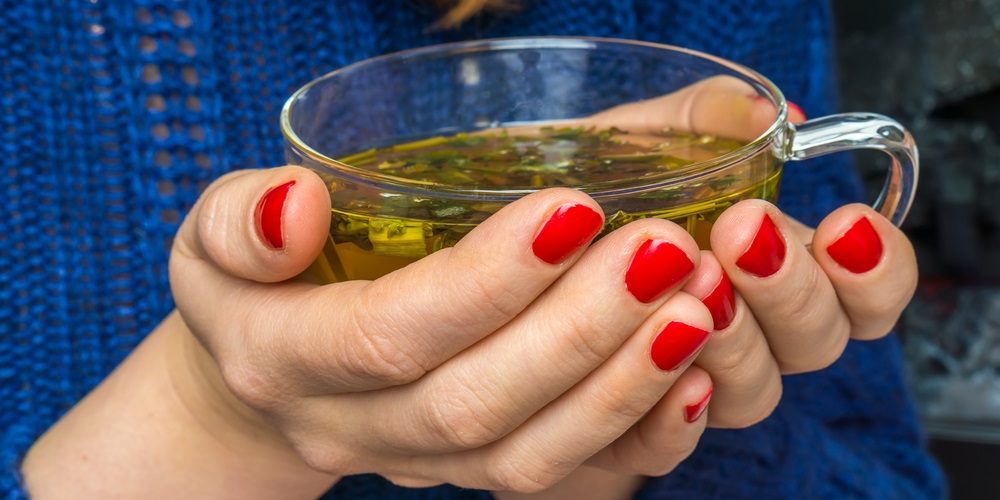- Green tea contains several substances that may promote weight loss, like caffeine, catechin, and antioxidants.
- While many people have experienced positive results, no significant studies prove that it’s effective.
- Health and wellness experts say there’s no harm in consuming green in moderation.
Dieticians and physicians agree: maintaining a healthy body weight can prolong your life significantly, helping to lower your risk of developing heart disease, diabetes, and other chronic illnesses.
Despite these benefits, many people find that keeping the weight off is a big challenge. There’s no magic weight loss pill, but there is evidence that a hot cup of green tea could help.
What’s in green tea?
Green tea comes from the Camellia sinensis plant, otherwise known as the tea plant or tea tree. It has a long history in healing, primarily in Chinese medicine, where it has been used for everything from repairing wounds to treating headaches. Though green tea is largely devoid of significant nutrients, it does contain several phytochemicals and flavonoids with proven antioxidant and anti-inflammatory benefits.
“When you drink a cup of green tea, you are ingesting a number of substances with beneficial bodily effects,” says Dr. Lonny Green, a weight loss specialist at Rejuvenate MD in Glen Allen, VA. “Green tea contains a variety of compounds, including caffeine and a type of flavonoid called catechin — specifically EGCG (epigallocatechin gallate).”
Green tea contains several ingredients that purportedly contribute to weight loss, including:
- Caffeine
The most promising fat buster in green tea is caffeine, which is known to stimulate metabolic rate, providing energy and some weight loss benefits.
“Caffeine is a well-known stimulant that has been shown to aid fat burning and improve exercise performance in numerous studies,” says Dr. Green. Some believe that caffeine and other ingredients in green tea increase fat oxidation, which helps break down fat cells, keeping us trim.
- Catechins
Green tea is also chock full of flavonoids known as catechins, which work alongside caffeine to provide weight-related benefits.
“Catechin is an antioxidant, and research suggests that both caffeine and catechin can speed up metabolism. Catechin plays a role in helping to break down excess fat, and both catechin and caffeine can increase the amount of energy the body uses,” says Dr. Green.
- Antioxidants
The primary antioxidant in green tea is EGCG, which may help slow down an enzyme that breaks down the hormone norepinephrine.
“The body’s nervous system uses norepinephrine to tell fat cells to break down fat,” says Dr. Green. An increase in norepinephrine means an increase in the amount of fat your body breaks down.
Is green tea a fat burner?
Although many experts believe that green tea leaves are loaded with ingredients that can help you lose weight, there are actually no studies that conclusively support its efficacy. Studies have shown, however, that certain substances in green tea are indeed beneficial — caffeine really can increase your metabolic rate, for example — but the actual long-term weight loss benefits seem to be minimal.
According to a study published in Clinical Nutrition, women who consumed about 1,350 milligrams of green tea per day dropped an average of 2.4 pounds in 15 weeks, whereas the control group dropped 4.4 pounds over 12 weeks — not nearly enough to constitute significant weight loss. Other studies have shown that the catechins in green tea do show a small, positive effect when used to help people lose weight.
Aside from weight loss, some studies indicate that consuming the popular tea could provide overall health benefits. Proponents claim that green tea can cure everything from high blood pressure to type 2 diabetes and cardiovascular disease. In fact, several studies have shown that the tea might help curb heart problems — a 2015 meta-analysis showed that drinking one cup of green tea every day resulted in a 5 percent lower risk of death from heart disease.
How is green tea prepared for weight loss?
There are two primary ways to use green tea to lose weight: by consuming it (either eating or drinking it), or by taking green tea supplements. Using green tea bags, you can brew yourself hot or iced tea and drink it in moderation. You can also use green tea powder — otherwise known as matcha green tea powder — to make smoothies, baked goods, and more.
“A common recommendation is to drink two to three cups of green tea per day, or to take 250 to 500 milligrams of green tea extract once a day,” says Dr. Green, citing a 2004 study from the Journal of Health Science.
While the most common way to get your green tea fix is to sip it from a teacup, you can also take supplements in the form of capsules. But be careful — consuming large doses in the form of daily supplements can trigger serious side effects.
Also bear in mind that the natural medicine industry remains largely unregulated, which increases the incidence of quality control problems during the manufacturing process. Ask your physician for advice before purchasing any type of herbal supplement.
What are the side effects?
While drinking a cup of hot green tea every once in a while likely won’t lead to any serious health complications, it is commonly associated with mild side effects as well as some serious but rare complications, including instances of permanent liver damage.
The key, according to experts, is to keep your consumption of green tea relatively low, at no more than 500 milligrams per day.
“Green tea is generally considered to be safe for adults when drinking it in moderation,” says Dr. Green. “If you have stomach problems, iron deficiency, or a low tolerance to caffeine, you may want to avoid it or drink it in smaller amounts.”
You may also want to limit your green tea consumption if you’re pregnant or nursing. Those with anemia, anxiety disorders, bleeding disorders, diabetes, heart conditions, liver disease, and osteoporosis should also be careful.
Dr. Green also says that it’s important to avoid large doses of green tea in order to prevent some mild digestive side effects and other unpleasant conditions. “Drinking more than five cups a day is thought to be unsafe,” he warns. Consuming excess amounts of green tea can cause diarrhea, heartburn, stomach problems, headaches, and palpitations.
The bottom line
So can green tea really help you reach your ideal weight? Caffeine could help you boost exercise performance, and catechins may help speed up your metabolism and facilitate faster weight loss.
There aren’t any groundbreaking studies that show a few cups of green tea can melt away fat, but there is evidence that it has minor health benefits. As long as you stick to the recommended dosage, there’s no harm in giving green tea a try.









